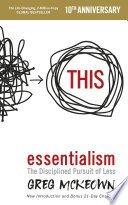Essentialism by Greg McKeown — Book Review
In a world that seems to constantly demand more of us—more time, more energy, more commitment—there’s something incredibly refreshing about the idea of “less is more”. This is the central tenet of Greg McKeown’s “Essentialism: The Disciplined Pursuit of Less”. The book invites readers to pare down the clutter in their lives, both physically and mentally, in order to focus on what’s truly essential. But in a society that often equates busyness with success, can we really afford to do less? Or, perhaps more provocatively, can we afford not to?
“Essentialism” is a breath of fresh air in the often frenetic world of self-help literature. McKeown’s tone is both authoritative and empathetic, offering guidance without judgment. The pacing of the book is deliberate, akin to a mentor walking alongside you rather than dragging you through a series of life hacks. It’s a reflective journey that encourages introspection and mindful choices, rather than offering a one-size-fits-all solution. The mood is contemplative, almost meditative, making it ideal for readers who are exhausted by the hustle culture and are yearning for a more meaningful existence.
The book’s core audience seems to be professionals caught in the whirlwind of modern life—executives, entrepreneurs, and creatives who are juggling numerous responsibilities and commitments. However, its appeal is universal, touching anyone who feels overwhelmed by the pressures of contemporary living. McKeown adeptly speaks to those who are tired of saying yes to everything and are ready to say yes only to what truly matters.
At the heart of “Essentialism” lies a compelling argument: the way to achieve more is to do less, but better. McKeown proposes that essentialism is not about doing less for the sake of less; it’s about making the wisest possible investment of your time and energy to operate at our highest point of contribution. This begins with a mind shift—from the undisciplined pursuit of more to the disciplined pursuit of less. McKeown outlines a systematic approach to identifying and eliminating non-essentials, empowering readers to reclaim control over their choices and their lives.
One of the book’s key concepts is the distinction between the trivial many and the vital few. McKeown argues that most of what we do has little impact, and by focusing on the few things that are truly important, we can make a more significant difference. He emphasizes the importance of clarity in decision-making and the courage to say no, even when it’s uncomfortable. The book is peppered with practical advice and real-world examples that illustrate how saying no to the non-essential can lead to greater success and satisfaction.
“Essentialism” doesn’t exist in a vacuum; its ideas resonate against the backdrop of a global shift towards minimalism and mindfulness. In an era where Marie Kondo has taught us to declutter our homes, McKeown challenges us to declutter our minds and schedules. His philosophy aligns well with the current cultural zeitgeist, which increasingly values quality and intentional living over quantity and mindless accumulation.
Moreover, the book’s themes echo in the ongoing dialogue about work-life balance and the mental health crisis exacerbated by overwork. In a world still reeling from the pandemic, where remote work has blurred the lines between professional and personal life, McKeown’s lessons are particularly timely. They serve as a reminder that our time is finite, and how we choose to spend it can significantly affect our well-being.
Reflecting on “Essentialism” has been a transformative experience. It has prompted me to scrutinize my own habits and choices with a critical eye. In a sense, it’s a call to arms against the tyranny of busyness. It’s made me reconsider what I deem as productive and has shifted my focus from quantity to quality. This mindset has not only reshaped my approach to work but has also enriched my personal life, allowing me to invest more deeply in relationships and activities that truly matter.
The beauty of “Essentialism” lies in its simplicity and its power to resonate on a personal level. It’s not about drastic life changes but rather about making small, deliberate choices that add up to a more meaningful and fulfilling life. McKeown’s insights are like a lighthouse guiding us through the stormy seas of modern life, reminding us that it’s okay to focus on what’s essential and let go of the rest.
In conclusion, “Essentialism” is more than just a book—it’s a movement towards a more intentional and thoughtful way of living. If you find yourself overwhelmed by the demands of modern life, or if you’re simply seeking a more purposeful existence, this book is a must-read. It offers a valuable framework for anyone looking to reclaim control over their time and energy, and ultimately, over their life. McKeown’s wisdom is a beacon of clarity in a noisy world, urging us to focus on the things that truly matter. Whether you’re a seasoned professional or someone navigating the complexities of life, “Essentialism” has something profound to offer.

